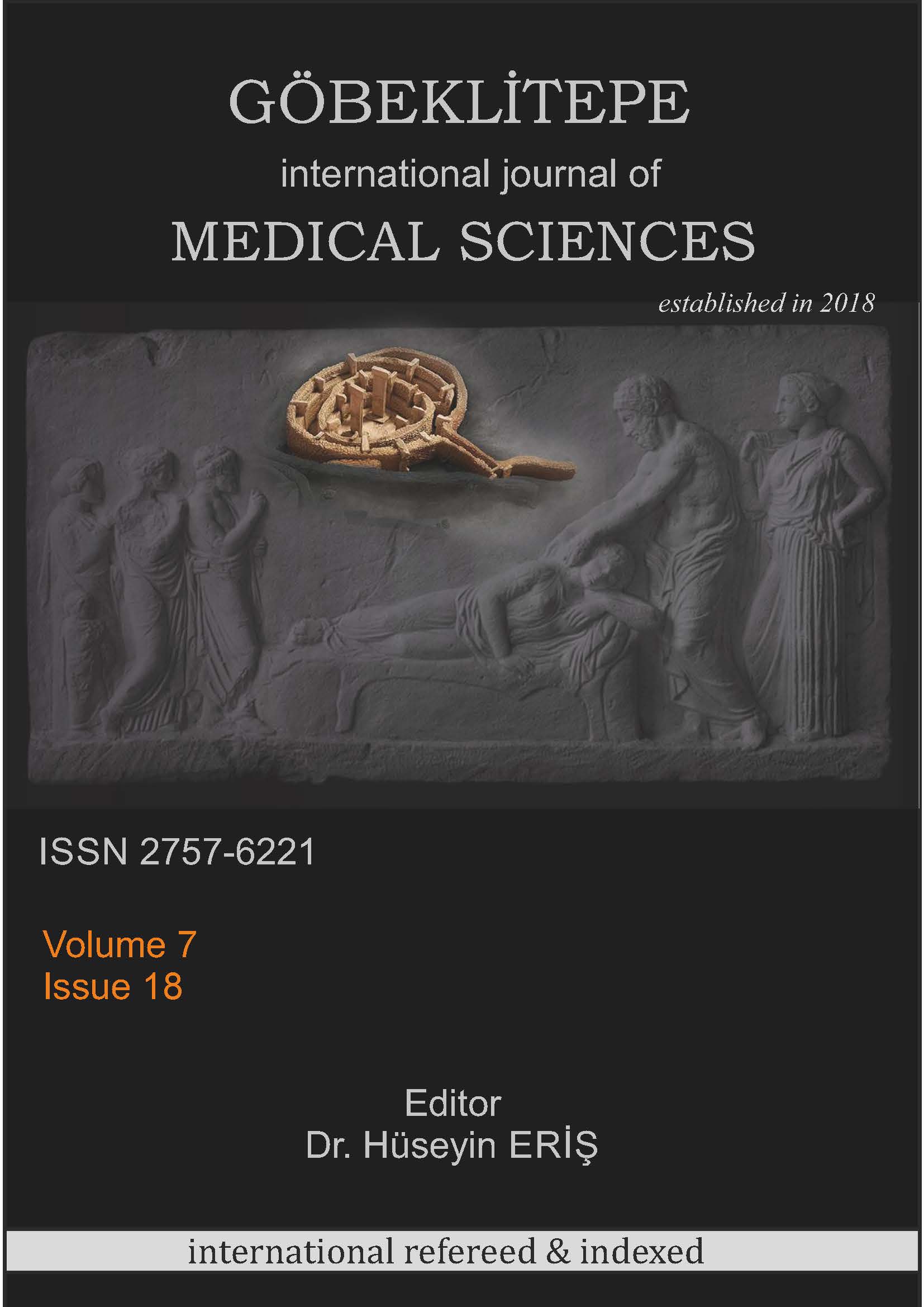PPSYCHOSOCIAL HEALTH IN PREGNANT WOMEN AND ITS ASSOCIATION WITH FEAR OF CHILDBIRTH AND SPOUSE SUPPORT
Keywords:
Pregnancy, Psychosocial health, fear of childbirth, Spousal SupportAbstract
This study aims to investigate the psychosocial health of pregnant woman and its association with fear of childbirth and spouse support. This descriptive and cross-sectional study was conducted with 250 women who applied to the Gynecology and Obstetrics Clinics of Sivas Numune Hospital between 12.03.2019 - 18.07.2019. Pregnant Introduction Form, Pregnancy Psychosocial Health Assessment Scale (PPHAS), Wijma Delivery Expectancy Questionnaire (W-DEQ) Version A and Spouse Support Scale (SSS) were used for data collection. For the comparison, regarding the data with normal distribution, t test for two groups and ANOVA for more than two groups were employed; regarding the data with non-normal distribution, Mann Whitney U test and Kruskal Wallis for more than two independent groups were used. A significant and negative correlation was determined between the psychosocial health of the participants and their fear of childbirth (p<0.001), and there was a significant and positive correlation between psychosocial health and spouse support (p<0.001). The fear of women regarding childbirth negatively affects psychosocial health status, while a high level of perceived spouse support positively affects psychosocial health in pregnancy.
References
Corrigan, L., Moran, P., McGrath, N., Eustace-Cook, J., & Daly, D. (2022). The characteristics and effectiveness of pregnancy yoga interventions: a systematic review and meta-analysis. BMC Pregnancy Childbirth, 22(1), 250. https://doi.org/10.1186/s12884-022-04474-9
Fowler, J.R., Mahdy, H., & Jack, B.W. (2022). Pregnancy. In: StatPearls. Treasure Island (FL): StatPearls Publishing, Accessed May 10, 2023.
Reilly, N., Hadzi-Pavlovic, D., Loxton, D., Black, E., Mule, V., & Austin. M.P. (2022). Supporting routine psychosocial assessment in the perinatal period: The concurrent and predictive validity of the Antenatal Risk Questionnaire-Revised. Women Birth 35 (2):e118-e124. https://doi.org/10.1016/j.wombi.2021.04.003
Koc, O., & Ozkan, H. (2022). Perceptıon of traumatıc chıldbırth of women and factors affectıngj Basic. Clin Health Sci 6:608-616. https://doi.org/10.30621/jbachs.1001319
Cattane, N., Räikkönen, K., Anniverno, R., Mencacci, C., Riva, M. A., Pariante, C. M., & Cattaneo, A. (2021). Depression, obesity and their comorbidity during pregnancy: effects on the offspring's mental and physical health. Molecular psychiatry, 26(2), 462–481. https://doi.org/10.1038/s41380-020-0813-6
Vlenterie, R., van Gelder, M. M. H. J., Anderson, H. R., Andersson, L., Broekman, B. F. P., Dubnov-Raz, G., El Marroun, H., Ferreira, E., Fransson, E., van der Heijden, F. M. M. A., Holzman, C. B., Kim, J. J., Khashan, A. S., Kirkwood, B. R., Kuijpers, H. J. H., Lahti-Pulkkinen, M., Mason, D., Misra, D., Niemi, M., Nordeng, H. M. E., … Roeleveld, N. (2021). Associations Between Maternal Depression, Antidepressant Use During Pregnancy, and Adverse Pregnancy Outcomes: An Individual Participant Data Meta-analysis. Obstetrics and gynecology, 138(4), 633–646. https://doi.org/10.1097/AOG.0000000000004538
Garcia, E. R., & Yim, I. S. (2017). A systematic review of concepts related to women's empowerment in the perinatal period and their associations with perinatal depressive symptoms and premature birth. BMC pregnancy and childbirth, 17(Suppl 2), 347. https://doi.org/10.1186/s12884-017-1495-1
Bakır, N., & Sarızayim, Ş. (2020). The relationship between psychosocial health and prenatal attachment in pregnant women. Perinatal Journal, 28(2): 73–81. https://doi.org/10.2399/prn.20.0282006
Ozturk, R., & Guner, Ö. (2020). Comparing psychosocial health in women with and without risky pregnancies: A cross-sectional study. Erciyes Med J, 42(4): 417–424. https://doi.org/10.14744/etd.2020.66750
Bazarganipour, F., Mahmoodi, H., Shamsaee, B., & Taghavi, S.A. (2015). The frequency and severity of nausea and vomiting during pregnancy and its association with psychosocial health. Journal of Midwifery & Reproductive Health, 3(3): 401-407. https://doi.org/10.22038/jmrh.2015.4398
O'Connell, M. A., Khashan, A. S., & Leahy-Warren, P. (2021). Women's experiences of interventions for fear of childbirth in the perinatal period: A meta-synthesis of qualitative research evidence. Women and birth : journal of the Australian College of Midwives, 34(3), e309–e321. https://doi.org/10.1016/j.wombi.2020.05.008
Bryanton, J., Beck, C. T., & Morrison, S. (2022). When Fear Surrounding Childbirth Leads Women to Request a Planned Cesarean Birth. Western journal of nursing research, 44(7), 643–652. https://doi.org/10.1177/01939459211010192
Dursun, E., Kızılırmak., A. & Mucuk, S. (2021). The relationship between personality characteristics and fear of childbirth: A descriptive study. Arch Psychiatr Nurs, 35 (3), 296-302. https://doi.org/10.1016/j.apnu.2020.09.018
Tan, H. S., Agarthesh, T., Tan, C. W., Sultana, R., Chen, H. Y., Chua, T. E., & Sng, B. L. (2021). Perceived stress during labor and its association with depressive symptomatology, anxiety, and pain catastrophizing. Scientific reports, 11(1), 17005. https://doi.org/10.1038/s41598-021-96620-0
Kowalska, J., Dulnik, M., Guzek, Z., & Strojek, K. (2022). The emotional state and social support of pregnant women attending childbirth classes in the context of physical activity. Scientific reports, 12(1), 19295. https://doi.org/10.1038/s41598-022-23971-7
Chen, H. H., Lai, J. C., Wang, K. L., & Chien, L. Y. (2022). Bi-dimensional acculturation and social support on perinatal depression in marriage-based immigrant women. Archives of psychiatric nursing, 41, 227–233. https://doi.org/10.1016/j.apnu.2022.08.001
Zarghani, N.H., Nazari, M., Shayeghian, Z., & Shahmohammadi, S. (2016). Social support in the pregnant and non-pregnant women and its associated dimensions. Journal of Nursing and Midwifery Sciences 3 (2):11-18. doi:10.18869/acadpub.jnms.3.2.11.
Míguez, M. C., & Vázquez, M. B. (2021). Risk factors for antenatal depression: A review. World journal of psychiatry, 11(7), 325–336. https://doi.org/10.5498/wjp.v11.i7.325
Fan, S., Guan, J., Cao, L., Wang, M., Zhao, H., Chen, L., & Yan, L. (2021). Psychological effects caused by COVID-19 pandemic on pregnant women: A systematic review with meta-analysis. Asian journal of psychiatry, 56, 102533. https://doi.org/10.1016/j.ajp.2020.102533
Bedaso, A., Adams, J., Peng, W., & Sibbritt, D. (2021). The relationship between social support and mental health problems during pregnancy: a systematic review and meta-analysis. Reproductive health, 18(1), 162. https://doi.org/10.1186/s12978-021-01209-5
Hall, H., Munk, N., Carr, B., Fogarty, S., Cant, R., Holton, S., Weller, C., & Lauche, R. (2021). Maternal mental health and partner-delivered massage: A pilot study. Women and birth : journal of the Australian College of Midwives, 34(3), e237–e247. https://doi.org/10.1016/j.wombi.2020.05.003
Korukcu. Ö., Deliktaş, A., Aydın, R., & Kabukcuoğlu, K. (2017). Investigation of the Relationship Between the Psychosocial Health Status and Fear of Childbirth in Healthy Pregnancies. Clinical and Experimental Health Sciences, 7(4), 152-158. https://doi.org/10.5152/clinexphealthsci.2017.359
Yıldız, H. (2011). Development Study of the Pregnancy Psychosocial Health Assessment Scale. Maltepe University Journal of Nursing Science and Art 4(1), 63-74. http://hemsirelik.maltepe.edu.tr/dergiler/nisan/63-74.pdf
Wijma, K., Wijma, B., & Zar, M. (1998). Psychometric aspects of the W-DEQ; a new questionnaire for the measurement of fear of childbirth. Journal of psychosomatic obstetrics and gynaecology, 19(2), 84–97. https://doi.org/10.3109/01674829809048501
Korukcu, O., Kukulu, K., & Firat, M. Z. (2012). The reliability and validity of the Turkish version of the Wijma Delivery Expectancy/Experience Questionnaire (W-DEQ) with pregnant women. Journal of psychiatric and mental health nursing, 19(3), 193–202. https://doi.org/10.1111/j.1365-2850.2011.01694.x
Yıldırım, İ. (2004). Development of spouse support scale. Turkish Psychological Counseling and Guidance Journal, 3(22), 19-26. https://dergipark.org.tr/tr/pub/tpdrd/issue/21442/229709
Aksay, Y., Gulhan, Y. B., Saygın, N., Korukcu, O. (2017). Is There any Effect of Psychosocial Health of Pregnant Women on Birth Preference. Gümüşhane University Journal Of Health Sciences, 6(4):138-145. https://dergipark.org.tr/tr/download/article-file/383686
Ozsahin, Z., Erdemoğlu, Ç., Karakayalı, Ç. (2018). Psychosocial Health Level and Related Factors in Pregnancy. The Journal of Turkish Family Physician, 9(2):34 46. https://doi.org/10.15511/tjtfp.18.00234
Gulec, D., Ozturk, R., Sevil, Ü., Kazandı, M. (2014). The Relationship Between Fear of Birth and Perceived Social Support of Pregnant Women. Türkiye Klinikleri Journal of Gynecology Obstetrics, 24(1):36-41. https://www.jcog.com.tr/article/en-gebelerin-yasadiklari-dogum-korkusu-ile-algiladiklari-sosyal-destek-arasindaki-iliski-68378.html
Erkaya, R., Karabulutlu, Ö., Çalık, K.Y. (2017). Defining Childbirth Fear and Anxiety Levels in Pregnant Women. Social and Behavioral Sciences, 237:1045-1052. https://doi.org/10.1016/j.sbspro.2017.02.151
Barut, S., Uçar, T. (2018). Relationship Between Childbirth Self-Efficacy and Fear of Childbirth. Mersin University Journal of Health Sciences, 11(2):107-115. https://doi.org/10.26559/mersinsbd.331077
Erdemoğlu, Ç., Ozsahin, Z., Altıparmak, S. (2019). The effect of personality traits of pregnants and their ways of coping with stress on the fear of childbirth. The Journal of Turkish Family Physician, 10(3): 130-139. https://doi.org/10.15511/tjtfp.19.00330
Mortazavi, F., Agah, J. (2018). Childbirth Fear and Associated Factors in a Sample of Pregnant Iranian Women. Oman Medical Journal, 33(6):497–505. https://doi.org/10.5001/omj.2018.91
Fenwick, J., Toohill, J., Gamble, J., Creedy, D. K., Buist, A., Turkstra, E., Sneddon, A., Scuffham, P. A., & Ryding, E. L. (2015). Effects of a midwife psycho-education intervention to reduce childbirth fear on women's birth outcomes and postpartum psychological wellbeing. BMC pregnancy and childbirth, 15, 284. https://doi.org/10.1186/s12884-015-0721-y
Rouhe, H., Salmela-Aro, K., Toivanen, R., Tokola, M., Halmesmäki, E., Ryding, E. L., & Saisto, T. (2015). Group psychoeducation with relaxation for severe fear of childbirth improves maternal adjustment and childbirth experience--a randomised controlled trial. Journal of psychosomatic obstetrics and gynaecology, 36(1), 1–9. https://doi.org/10.3109/0167482X.2014.980722
Størksen, H. T., Garthus-Niegel, S., Adams, S. S., Vangen, S., & Eberhard-Gran, M. (2015). Fear of childbirth and elective caesarean section: a population-based study. BMC pregnancy and childbirth, 15, 221. https://doi.org/10.1186/s12884-015-0655-4
Kordi, M., Bakhshi, M., Masoudi, Ş., & Esmaily, H. (2017). Effect of childbirth psychoeducation program on the level of fear of childbirth in primigravid women. Evidence Based Care Journal, 7, 26-34. https://doi.org/10.22038/EBCJ.2017.25676.1575
Ferraro, A. A., Rohde, L. A., Polanczyk, G. V., Argeu, A., Miguel, E. C., Grisi, S. J. F. E., & Fleitlich-Bilyk, B. (2017). The specific and combined role of domestic violence and mental health disorders during pregnancy on new-born health. BMC pregnancy and childbirth, 17(1), 257. https://doi.org/10.1186/s12884-017-1438-x
Xiaowen, W., Guangping, G., Ling, Z., Jiarui, Z., Xiumin, L., Zhaoqin, L., Hongzhuan, L., Yuyan, Y., Liyuan, Y., & Lin, L. (2018). Depression and anxiety mediate perceived social support to predict health-related quality of life in pregnant women living with HIV. AIDS care, 30(9), 1147–1155. https://doi.org/10.1080/09540121.2018.1456640
Parys, A. S. V., Deschepper, E., Michielsen, K., Galle, A., Roelens, K., Temmerman, M., & Verstraelen, H. (2015). Intimate partner violence and psychosocial health, a cross-sectional study in a pregnant population. BMC pregnancy and childbirth, 15, 278. https://doi.org/10.1186/s12884-015-0710-1
Barton, K., Redshaw, M., Quigley, M. A., & Carson, C. (2017). Unplanned pregnancy and subsequent psychological distress in partnered women: a cross-sectional study of the role of relationship quality and wider social support. BMC pregnancy and childbirth, 17(1), 44. https://doi.org/10.1186/s12884-017-1223-x
Milgrom, J., Hirshler, Y., Reece, J., Holt, C., & Gemmill, A. W. (2019). Social Support-A Protective Factor for Depressed Perinatal Women?. International journal of environmental research and public health, 16(8), 1426. https://doi.org/10.3390/ijerph16081426
Downloads
Published
Versions
- 2024-12-30 (3)
- 2024-12-29 (2)
- 2024-12-27 (1)
How to Cite
Issue
Section
License
Copyright (c) 2024 Göbeklitepe Sağlık Bilimleri Dergisi

This work is licensed under a Creative Commons Attribution 4.0 International License.




